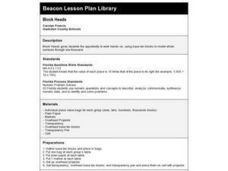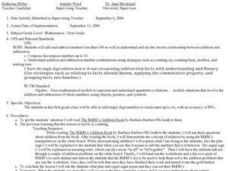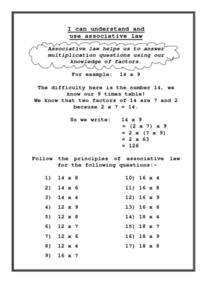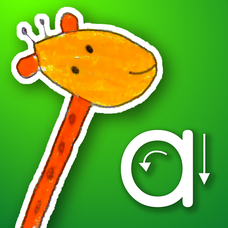Curated OER
Factors, Primes, Squares
Teach the joys of factoring and introduce prime and square numbers. Upper elementary learners are introduced to these concepts through complete definitions, examples, and practice problems. A variety of strategies, such as factor trees...
Curated OER
Popcorn
What a great way to have your kids practice odd and even number recognition. They play the game called "Odd and Even Popcorn," to practice odd and even numbers.
Curated OER
Block Heads
Learners demonstrate whole numbers through one thousand using base ten blocks. They model and describe given numbers using ten blocks.
Curated OER
M & M Addition
Eat your math manipulatives, are you serious? Yup, Learners listen to the story The M & M's Addition book, add single digit numbers to reach sums up to six, and demonstrate addition and subtraction number combinations using several...
Curated OER
Multiplication Patterns
In this multiplication patterns worksheet, learners solve and complete 6 different problems that include using patterns to multiply. First, they use the numbers circles on the sheet to identify pairs of numbers that share similar...
Curated OER
Associative Law
Upper graders and middle schoolers use the associative property to solve problems containing one and two digit numbers. They complete 17 problems.
Curated OER
Estimating Solutions
Finding approximate solutions to word problems allows users to assess the reasonableness of their answers. In a well-paced lesson, the class rounds numbers to estimate the solutions. They explain their thinking and determine if the...
Curated OER
Ordering Integers
Sixth and seventh graders compare and order integers. After locating integers in a newspaper, they describe examples of negative and positive integers. They draw a thermometer and locate positive and negative integers on the scale. In...
Curated OER
Learning about Fibonacci
In this learning about Fibonacci worksheet, students read about Leonardo Fibonacci and his contribution to mathematics, then study the pattern of Fibonacci numbers, in math and in nature.
Curated OER
Estimating Solutions to Word Problems
Learners use estimation to determine the answers to word problems by rounding whole numbers. In this estimation lesson plan, pupils compare and contrast solutions using the best answer.
Curated OER
Addition Table
In this addition table instructional activity, 2nd graders fill in the addition table with answer to problems with numbers 1 through 10. Students fill in 48 answers because 52 are given to them.
Curated OER
Make a Sundial
Young scholars explore space science by conducting a sun experiment in class. In this time telling lesson, students discuss how the sun sits in our sky at exact times each day and how astronomy is based on our perspective of the solar...
North Carolina Standard Curriculum
Rhythm Counting
Understanding time signatures and rhythm counting are two very important parts of playing an instrument well. Here are three basic lessons rolled into one that prompt upper graders to play their instruments with care. They'll practice...
Curated OER
¿Qué hora es?
Use this resource to quiz your language learners on telling time. Two exercises are provided; the first one asks quiz takers to use the digital time to write out the time in Spanish. The second exercise is the exact opposite: learners...
Curated OER
ASL: Lesson 10
Focus on learning how to sign cardinal and ordinal numbers, nouns, and lexicalized fingerspelling. Here is lesson 10 of the series on learning ASL. Provided, are multiple links that provide a visual guide to proper signing. Teach your...
Music Fun
Overhead Transparencies
Classroom and studio music instructors will find this packet of 10 transparencies of major value. Images of treble and bass clefs, notes and rests, note values, time signatures, and music language are included. Nothing minor about this...
Curriculum Corner
Guest Teacher Plans: Kindergarten
Emergencies happen. Be prepared the next time you have to call in a substitute with a lesson plan designed to meet the needs of a kindergarten class. Throughout the day, class members work with number and alphabet cards, identify numbers...
EngageNY
Scientific Notation
Young mathematicians learn how scientific notation is meant to save time. Part 10, out of a series of 15, asks scholars to recognize the correct use of scientific notation and finish by adding and subtracting numbers using the notation.
THUP Games
Monkey Math School Sunshine
Hang out at the beach and listen to some relaxing tunes, all while developing basic math skills. An endless source of fun and learning for young children!
Collaborative Learning Project
Four in a Row Addition and Subtraction
Scroll down to find four fun addition and subtraction partner game boards, complete with endless opportunities for practice with numbers 0-38. Kids choose numbers from a number box and, depending on the game, either find the sum or the...
Roy Winata
iWriteWords (Handwriting Game)
Give me a W! Give me an O! Give me a W! What does it spell? Wow! Teach youngsters how to write letters and numbers with colorful tracing activities that include encouraging audio and make writing enjoyable. Soon, they will be writing...
Curated OER
Pi Day: The Other Math Holiday!
Happy Pi Day! This collection of games, experiments, and activities leads participants through an exploration of the many aspects and attributes of that mysterious quantity, pi. Activities range from using statistical experimentation to...
Illustrative Mathematics
Where Do I Go?
Practice sequencing numbers 1–100 in a card sequencing activity. The hands-on learning makes a short activity flexible and fun. The opportunities are endless and easy to implement.
EngageNY
The Zero Product Property
Zero in on your pupils' understanding of solving quadratic equations. Spend time developing the purpose of the zero product property so that young mathematicians understand why the equations should be set equal to zero and how that...

























